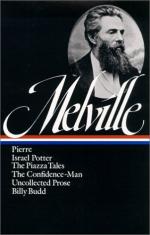Long ago the haunt of rank, the Latin Quarter still retains many old buildings whose imposing architecture singularly contrasts with the unassuming habits of their present occupants. In some parts its general air is dreary and dim; monastic and theurgic. In those lonely narrow ways—long-drawn prospectives of desertion—lined with huge piles of silent, vaulted, old iron-grated buildings of dark gray stone, one almost expects to encounter Paracelsus or Friar Bacon turning the next corner, with some awful vial of Black-Art elixir in his hand.
But all the lodging-houses are not so grim. Not to speak of many of comparatively modern erection, the others of the better class, however stern in exterior, evince a feminine gayety of taste, more or less, in their furnishings within. The embellishing, or softening, or screening hand of woman is to be seen all over the interiors of this metropolis.. Like Augustus Caesar with respect to Rome, the Frenchwoman leaves her obvious mark on Paris. Like the hand in nature, you know it can be none else but hers. Yet sometimes she overdoes it, as nature in the peony; or underdoes it, as nature in the bramble; or—what is still more frequent—is a little slatternly about it, as nature in the pig-weed.
In this congenial vicinity of the Latin Quarter, and in an ancient building something like those alluded to, at a point midway between the Palais des Beaux Arts and the College of the Sorbonne, the venerable American Envoy pitched his tent when not passing his time at his country retreat at Passy. The frugality of his manner of life did not lose him the good opinion even of the voluptuaries of the showiest of capitals, whose very iron railings are not free from gilt. Franklin was not less a lady’s man, than a man’s man, a wise man, and an old man. Not only did he enjoy the homage of the choicest Parisian literati, but at the age of seventy-two he was the caressed favorite of the highest born beauties of the Court; who through blind fashion having been originally attracted to him as a famous savan, were permanently retained as his admirers by his Plato-like graciousness of good humor. Having carefully weighed the world, Franklin could act any part in it. By nature turned to knowledge, his mind was often grave, but never serious. At times he had seriousness—extreme seriousness—for others, but never for himself. Tranquillity was to him instead of it. This philosophical levity of tranquillity, so to speak, is shown in his easy variety of pursuits. Printer, postmaster, almanac maker, essayist, chemist, orator, tinker, statesman, humorist, philosopher, parlor man, political economist, professor of housewifery, ambassador, projector, maxim-monger, herb-doctor, wit:—Jack of all trades, master of each and mastered by none—the type and genius of his land. Franklin was everything but a poet. But since a soul with many qualities, forming of itself a sort of handy index and pocket




